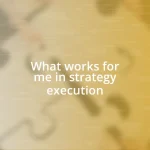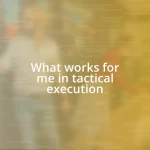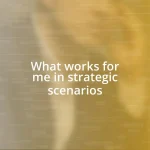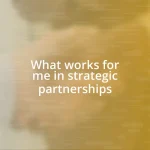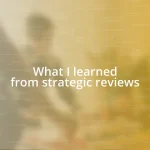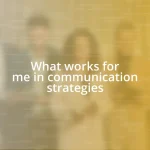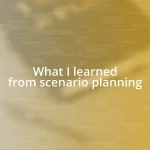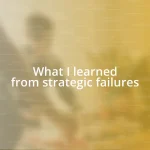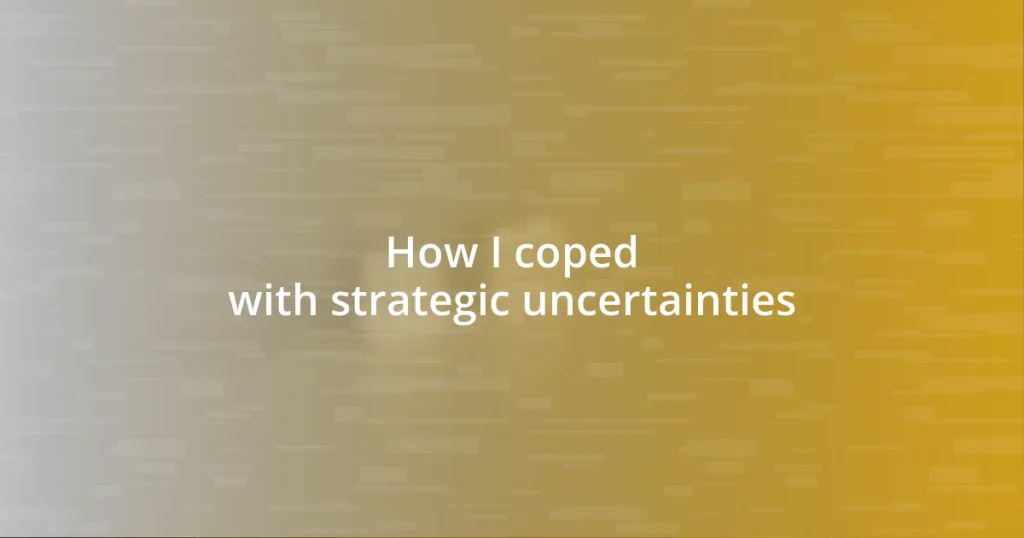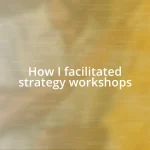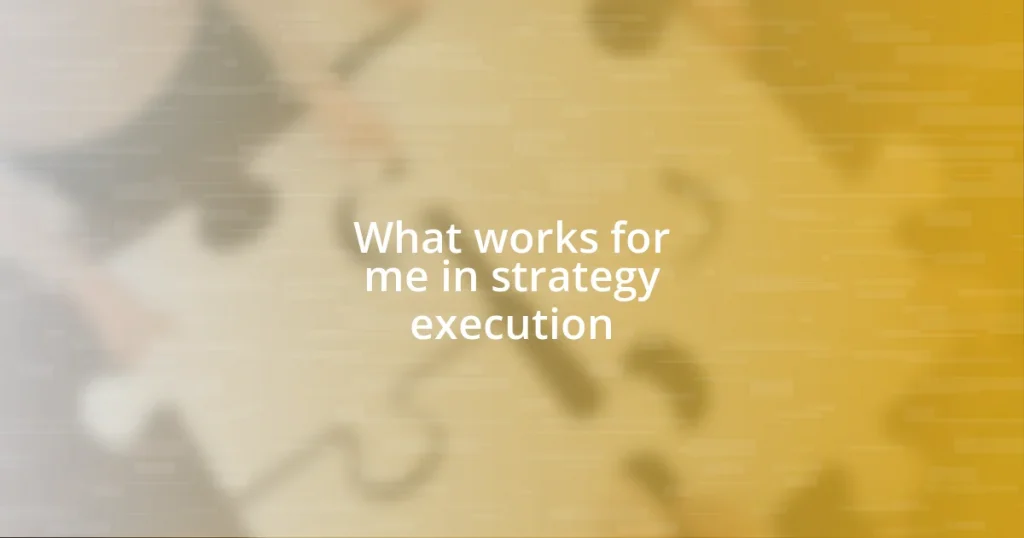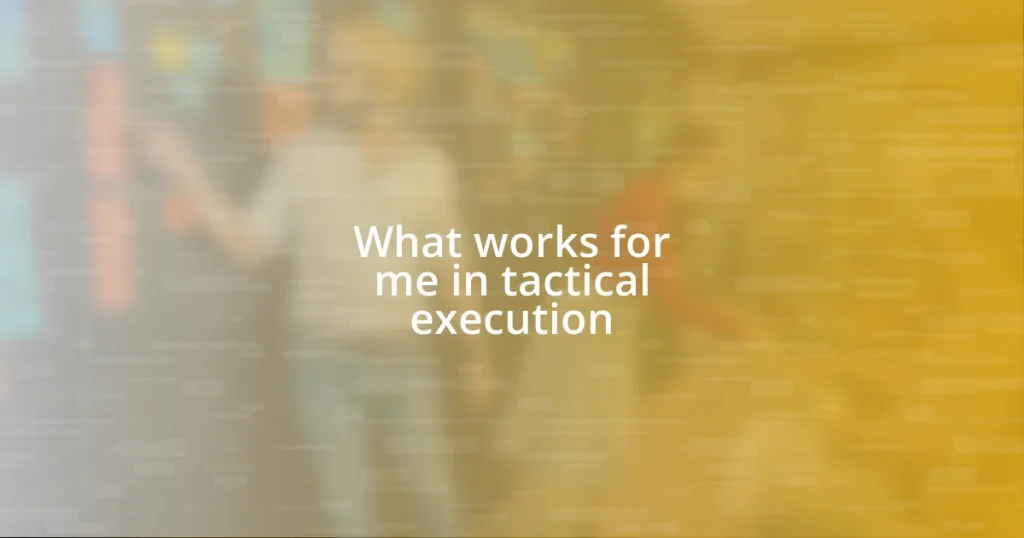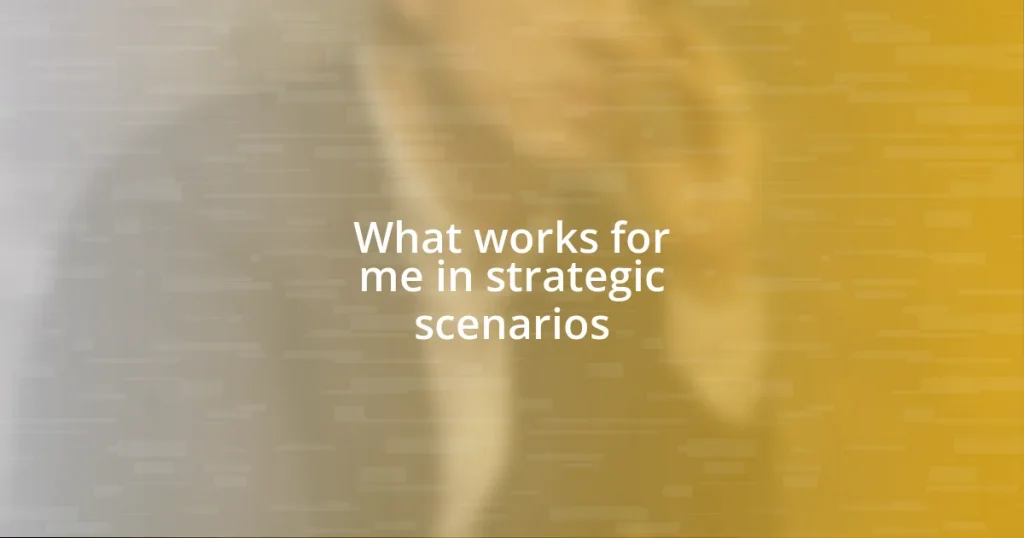Key takeaways:
- Embracing uncertainty can uncover new growth opportunities and innovative solutions in business strategy.
- Utilizing a support network enhances resilience and provides valuable perspectives during challenging times.
- Regular monitoring and reflection on progress lead to better adaptability and informed decision-making in the face of unexpected changes.

Understanding strategic uncertainties
Strategic uncertainties often arise from constantly changing market dynamics, technology advancements, and evolving consumer preferences. I remember a time when a sudden market disruption left me questioning whether to pivot my business approach. It made me ponder—how do we adapt when the ground seems to shift under our feet?
In my experience, dealing with these uncertainties requires a blend of foresight and flexibility. I recall launching a new product just as trends were shifting; it felt like walking on a tightrope. It’s essential to stay informed and be ready to adjust your strategies, but how do we build resilience in the face of unpredictability?
One thing I’ve learned is that embracing uncertainty can lead to unexpected opportunities. During a particularly challenging project, I found that my willingness to explore alternative strategies allowed me to discover creative solutions that I hadn’t considered before. Have you ever had a moment when what seemed like a setback actually unveiled new paths for growth? It’s those moments that truly redefine our understanding of strategic uncertainties.

Assessing personal coping strategies
Assessing personal coping strategies is a crucial step in navigating strategic uncertainties. I’ve often found that the strategies I employ are deeply tied to my personal experiences and emotional responses. For instance, during a particularly tumultuous industry shift, I relied heavily on a support network of colleagues and mentors, helping me not only to process my thoughts but also to gain fresh perspectives. This reinforcement showed me that I don’t have to face uncertainties alone.
On the flip side, I also recognized the importance of self-reflection in assessing my coping strategies. After a disappointing quarter, I took the time to journal about my feelings and reactions. It became clear that my initial anxiety was often rooted in fear of the unknown rather than facts. This self-awareness enabled me to approach uncertainty with a more level-headed mindset, leading to better decision-making going forward.
In evaluating my coping strategies, I sometimes compare different approaches to see which works best. I often weigh emotional responses against practical solutions, realizing that balancing both yields the optimal method for tackling uncertainties. Here’s a comparison of two methods I’ve utilized:
| Coping Strategy | Outcome |
|---|---|
| Support Network | Boosted confidence and gained new insights |
| Self-Reflection | Clearer understanding of fears and better decision-making |

Developing a flexible mindset
One of the most valuable lessons I’ve learned about developing a flexible mindset is the power of curiosity. Embracing a mindset of inquiry allows me to explore new ideas and possibilities rather than becoming anchored to one path. For example, during an unexpected downturn, instead of rigidly sticking to my original plan, I began to ask open-ended questions like “What if?” and “How else could this work?” This shift opened doors to innovative solutions I hadn’t previously considered.
Here are some key principles that have helped me cultivate a more flexible mindset:
- Stay Informed: Regularly gather information about industry trends, consumer behaviors, and technological advancements.
- Embrace Change: Instead of fearing change, view it as an opportunity for growth and exploration.
- Practice Adaptability: Develop the habit of adjusting plans rather than cleaving to them stubbornly.
- Reflect on Experiences: After tackling a challenge, I often reflect on what I learned, which helps me stay open to new approaches in the future.
By nurturing these principles, I’ve found that adaptability becomes a natural response, allowing me to navigate uncertainties with greater ease and confidence.

Implementing risk management techniques
Implementing risk management techniques has been a transformative experience for me. In one project, we identified potential risks early on, which allowed us to create a detailed contingency plan. That proactive approach was eye-opening—rather than waiting for a crisis, I began to see risk as something I could actively manage instead of passively endure.
I remember a time when I faced an especially daunting market shift. Running a risk assessment workshop with my team helped us pinpoint factors that could derail our strategy. During that session, I felt a sense of camaraderie—a reminder that it’s not just about handling risks alone but engaging others in the process. Why wouldn’t we want to leverage collective intelligence when navigating uncertainty?
One technique I’ve found particularly useful is scenario planning, where I envision various outcomes based on different strategic choices. For instance, I mapped out best-case, worst-case, and most-likely scenarios for a major product launch. This method not only eased my anxiety about the unknown but also sparked inventive ideas that emerged from thinking through potential challenges. Isn’t it fascinating how anticipation and preparation can sometimes yield creative solutions?

Leveraging support networks
One of the biggest revelations I’ve had in dealing with strategic uncertainties is the incredible strength found in support networks. In moments of distress, I often turned to colleagues and mentors for guidance. Their perspectives not only provided clarity but also reminded me of the importance of collaboration. Isn’t it comforting to know you’re not alone when facing challenges?
I’ll never forget a particularly tough phase when I felt overwhelmed. Reaching out to a friend in my industry sparked a crucial conversation that helped me think differently about my situation. We brainstormed solutions together, and that simple act transformed my mindset from feeling isolated to feeling empowered. It’s intriguing how sharing struggles can often lead to unexpected revelations and renewed energy.
Over time, I’ve realized that actively nurturing these networks—whether through regular check-ins or by offering support in return—has created a sense of community. This two-way relationship fosters trust and opens doors to valuable insights. How often do we pause to consider the wealth of wisdom sitting right in our networks? Embracing this idea has led to not just personal growth but also collective success in navigating uncertainty.

Monitoring progress and adjusting
I’ve learned that monitoring progress is more than just checking off boxes; it’s about engaging in a dynamic dialogue with your project. I distinctly recall a project where we implemented weekly review meetings. Initially, I thought it would be tedious, but those sessions became my favorite part of the week. The open discussions brought forth not just updates but also real-time insights, prompting us to pivot our strategies when necessary. Can you imagine how different outcomes can be when you have your finger on the pulse of your project?
Adjusting our approach based on progress is an art in itself. I once had to recalibrate my marketing strategy mid-launch due to unexpected consumer feedback. Instead of feeling defeated, I was invigorated by the challenge. By embracing this flexible mindset, I discovered that adjustments could lead to creative breakthroughs, like uncovering a niche audience I hadn’t initially considered. It’s a humbling reminder that sometimes the universe has other plans for us, isn’t it?
Setting up a dashboard to visualize key performance indicators was another game-changer for me. Seeing data laid out before me allowed for quicker assessment and easier adjustments. There was a moment when I noticed a data spike in social media engagement—it felt like finding a hidden treasure! Acting on that insight led us to amplify our online presence, ultimately boosting our success. How many opportunities do we miss when we fail to truly ‘see’ our progress?

Reflecting on lessons learned
Reflecting on the lessons learned through uncertainty has been quite an enlightening experience. One memorable lesson was how crucial it is to maintain a growth mindset. I remember feeling anxious during a particularly unpredictable market shift, but instead of succumbing to fear, I focused on the potential for learning. That shift in perspective allowed me to view challenges as opportunities to grow rather than obstacles. Isn’t it fascinating how a simple change in mindset can profoundly affect our approach and, ultimately, our outcomes?
Additionally, I’ve come to appreciate the power of resilience. There were times when setbacks felt insurmountable. I vividly recall a situation where a project I had poured my heart into failed to meet expectations. Rather than wallowing in disappointment, I consciously chose to analyze what went wrong. This practice not only helped me understand my missteps but also laid the groundwork for future successes. Have you ever noticed how embracing failure can be the key to unlocking future achievements?
Moreover, cherishing moments of reflection has allowed me to connect dots I hadn’t initially seen. I found journaling to be particularly valuable after navigating through uncertainties. As I scribbled down my thoughts, I often discovered patterns and insights that were otherwise buried beneath the chaos. It’s amazing how clarity arises when we take the time to pause and reflect. How often do we allow ourselves that necessary space to truly digest our experiences?
